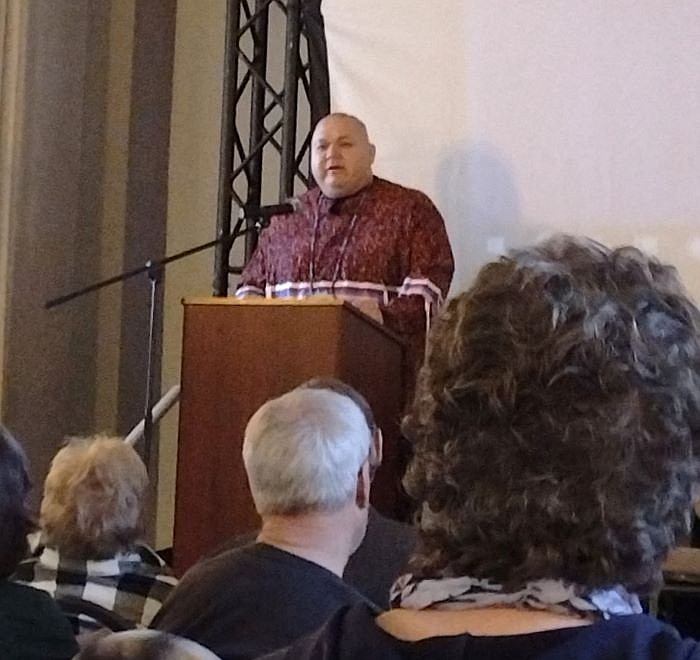Community called to be 'United Against Hate'
SANDPOINT — In a world saturated with hate, how do you bring light to darkness?
That was the question discussed at the United Against Hate summit, held this week in Sandpoint.
United Against Hate — an initiative launched by the Department of Justice — is an initiative focused on improving efforts to combat hate crimes and incidents through relationship building at the local level. Through these efforts, the U.S. Attorney’s Office is seeking to create and strengthen trust and partnerships among law enforcement, community leaders and residents.
Local leaders from across the region joined together Tuesday to learn how to build awareness, educate, and cultivate strategies to combat crimes born of hatred. Prosecutors also gave presentations on the legal definitions behind hate crimes and reporting mechanisms.
Gary Aitken Jr., Kootenai Tribe of Idaho vice chairman, shared his personal challenges during a panel discussion by community activists, relating his experiences as a tribal member who has faced “up-front bigotry”
“There were racial jokes, the N-word — my people were disrespected,” he said. “I see people who carry that weight on them from instances they went through.”
Aitken referenced his childhood experiences being punished for defending himself against bullies who targeted him.
“I learned to fight first,” he said. “But through the years, as I grew up, I learned that reaching people and building bridges was more effective. Each generation since has had to fight less. You can’t bring darkness to light but you can bring light to darkness, so as a tribe we focus on open communications, transparency and working with others.”
Luke Omodt, Bonner County commissioner, was also in attendance and said Aitken’s words were impactful to him.
“Working up in Bonners Ferry teaching, I had a great opportunity to work alongside Mr. Aitken and the tribe at times,” he said. “We had a lot of native students in school … Bonners Ferry also had a large population of students whose parents were migrant workers up at the hops farms.”
Omodt also referenced an example brought up at the summit of a taxi cab driver who was stabbed to death in Bonner County in 2017.
“Prosecutor [Louis] Marshall had a really good example of the tragedy of the human condition when he was speaking of the horrific murder that occurred with that taxi cab driver. That wasn’t based on a race crime or an ethnic crime, or some of the things that might fall under the definition of a hate crime, but it was just a crime of abject, moral depravity.”
Omodt also revisited Marshall’s memories of having to watch the GoPro recording of the murder.
“Prosecutor Marshall talked about having to watch that film and the impact that made upon him as a human being and a member of our species. When they investigated the murderer, they didn’t discover any malice based upon racism or a hate crime, it was just uncovered that this was a young person that made terrible choices and committed a senseless, violent, tragic crime.”
Omodt then asked, “How do we stand together to be a civilized society?”
He reflected on the word “united” — which introduces the initiative’s mission, “United Against Hate,” and the name of the country.
“If we look at the things that divide us versus the things that bring us together, we can find hate,” he said.
Instead, he suggested identifying the characteristics that unite.
FBI Special Agent Bryant Gunnerson, who focuses on hate crimes and civil rights violations, offered definitions for terms commonly tied to hate crimes. He explained that when a crime is committed and the motivation for that crime is based on hate, it is legally considered a hate crime.
Hateful rhetoric online is considered free speech as long as the perpetrator has not threatened anyone, he said. However, once a threat is issued, even online communications can be considered crimes.
“When a hateful Incident occurs without threats, we note it and move on,” one speaker said. “But if property damage or assault occurs, the DOJ can step in.”
Another term that was explained to the audience was special intent.
“Special intent involves the intention to cause injury to someone, and they are harder to prove than general intent crimes,” Marshall.
Andie Hinderlie, Bonners Ferry Lutheran minister and member of the Boundary County Human Rights Task Force, referenced letters sent to county commissioners in 2016 asking them to refuse refugees wishing to move to the community.
“We decided to provide a welcome in contrast to that,” he said. “We had an outdoor meeting downtown where speakers told of their families’ early arrival. I was an ‘immigrant’ from Minnesota the year before. As I began to share from 1 John 4:18, ‘There is no fear in love. But perfect love drives out fear.’ I was heckled. I said to the hecklers, ‘In many countries, you can’t heckle, so you’re lucky.’”
While the event was sponsored by U.S. Attorney Josh Hurwitt, he was unable to attend because of flight complications stopping his plane from landing in Spokane. However, he was able to address the audience on Zoom.
“We need to recognize that our differences among us make us stronger,” Hurwitt said. “I hope you’ll accept today’s program in the spirit with which it was intended.”
This event is sponsored by Hurwitt, the Bonner County Human Rights Task Force, the Boundary County Human Rights Task Force, the Kootenai Tribe of Idaho, DOJ Community Relations Service and the FBI.

